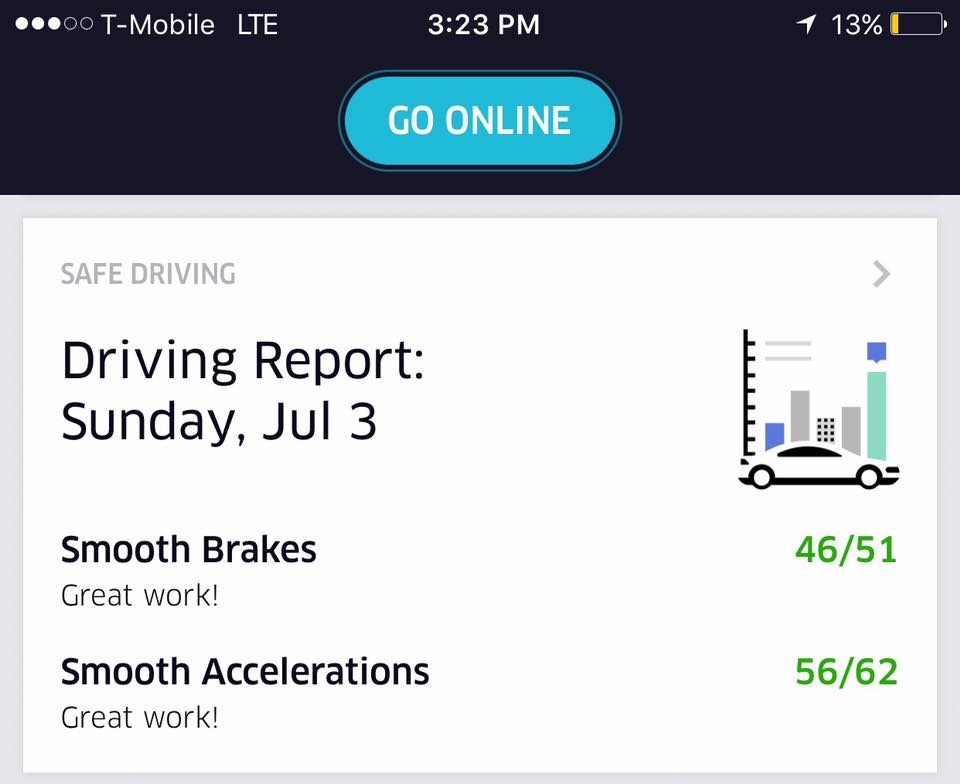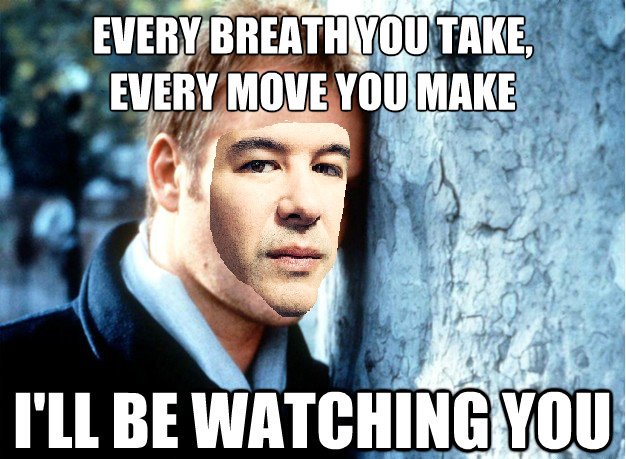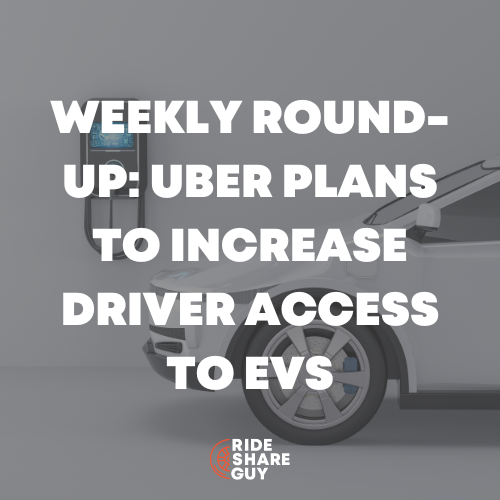Harry here. Getting feedback from Uber on ways to improve driving behavior can be a challenge. But today, RSG senior contributor Christian Perea takes a look at Uber’s new safety report card that they started sending out to drivers this week. It may feel a little big-brotherish but will it help drivers and make the roads safer?
Uber released a new feature last week that tracks driver behavior and provides them with a daily “Driving Report”. It’s meant to grade drivers on things like acceleration, braking, and whether or not your cell phone is properly secured.
Uber is gathering the real-time data using your phone’s GPS, accelerometer, and various other instruments in order to provide feedback on how you drive. This technology has actually been around for a while and is known as “telemetrics”. It’s currently used to monitor limo, cab, bus, and truck drivers all throughout the world.
For Uber drivers though, at the end of each day, you’ll receive a report that looks something like this:

Should Drivers Be Worried About This?
It feels strange to have a report like this coming from Uber that grades you from so far away. It kind of feels like you are being judged by the HAL9000.
Uber says it won’t use the data to limit drivers access to their platform, or affect their ratings. However, many drivers are understandably skeptical.

This might seem like a small invasion of privacy right now, but there are obvious worries that the program could expand to monitor things beyond driving habits like conversations and/or video. It’s always weird when the Uber driver app updates and asks you for access to your microphone, photos, etc. Why do they need access to all that stuff?
What Drivers Like About It
I checked out a few threads on UberPeople.net and looked into what RSG readers thought about it. Some liked it. Others not so much.
Many drivers support telemetrics since they provide feedback and coaching to help drivers drive smoother and safer. They like how their performance is being measured via gamification. Especially since the feedback is more constructive in nature.
The use of telemetrics could also do a lot of REAL good for safety that protects drivers and passengers. For example, having the ability to pull your speed and braking data if a passenger falsely accuses you of driving dangerously.
Advanced versions might be able to detect if you were hit by another car and locate where, and what force you were hit with, which could speed up insurance claims.
I would actually be okay with having this type of monitoring. Even if it included video or voice recording, since it would protect me from false accusations. However, I recognize that is my decision to make for myself and that drivers should have a choice in opting-in to that sort of tracking.
In reality, the big deal is how Uber will use this program in the future and whether or not they will continue to keep the “Driving Report” as more of a suggestive tool rather than an enforcement tool.
What Drivers Don’t Like: Abuse Potential
Drivers are skeptical about how the program will play out in the long run. People inherently do not like to be monitored by third parties. Even if it’s outlined on page 73 of a service agreement. Combine all of the fun NSA-style monitoring via cell phones with Uber’s history of how it treats its drivers and you can see that the skepticism is probably warranted too.
Is This Even Accurate Enough?
In the event that this became a safety enforcement tool, my biggest worry would be around whether it could legitimately measure safe driving in the first place. Here are a few examples where I see trouble with accuracy;
- Hard braking is sometimes necessary when someone cuts you off.
- Every phone measures these things differently and the accuracy can differ based off of a lot of uncontrollable factors (phone age, sensor accuracy, cell reception, etc.)
- Sometimes you have to accelerate quickly to avoid being hit by someone merging into your lane.
- Nobody drives the speed limit.
- Getting “marked down” because your phone fell off the dash.
- Using this data to deny insurance claims.
- Sharing this data with insurance companies, the DMV, or a third party.
All of these issues are not a big deal right now because there is no penalty associated with the “Driver Report” that Uber provides. When the stakes get higher though, these become more legitimate concerns among drivers, and many of them already feel they are being too harshly measured by TNCs.
My Thoughts
As it stands right now, I think the program makes sense. Uber has long been criticized for not providing much training for drivers and this seems like an easy way to do so. There are a lot of bad TNC drivers on the road, I’m sure you have noticed. This can certainly make those drivers safer and thus the roads safer, which is a good thing for all of us.
Uber has already been monitoring this sort of stuff for a while now. They already have all of the necessary permissions access from your phone to monitor this. So the only difference is that they are now sharing it with the driver. However, I don’t like the potential for abuse and I can see it turning into something that is utterly terrible. It all depends on how it gets used.
Will Uber eventually turn a good and positive thing into some kind of dystopian nightmare about how workers are treated in the 21st century?
Yeah…probably.
Oh yeah, I can’t do a post about Uber tracking your every movement to judge you without including this:

Drivers, what do you think about Uber’s new safety report card and all the tracking of your driving habits and data?
-Christian @ RSG
Save




